Major US groups taking long-term investment view
Intel Products Vietnam joined a huge business delegation to Vietnam last week, led by its vice president and general director Kim Huat Ooi, to meet with Vietnamese Deputy Minister of Trade and Industry Nguyen Sinh Nhat Tan.
The delegation included well-known names such as 3M, Abbott, Amazon, Bell, Chubb Life, Coca-Cola, and many others.
Ooi said that Intel has carried out initiatives to reduce power use at its factory and wants to do more, but is waiting for more specific support to improve the company’s operational efficiency in Vietnam.
Having been operating in Vietnam since 2006 with a total investment of $1.5 billion, its chip factory has seen success, with total export value at $10-11 billion in 2023, contributing to enabling Vietnam to join the global semiconductor supply chain.
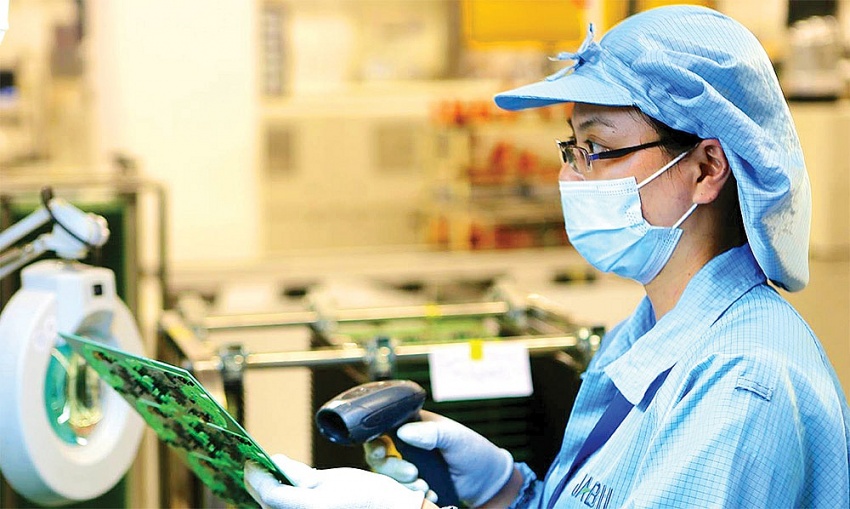 |
| American businesses want to promote cooperation with Vietnam in many fields to benefit both sides, photo Le Toan |
Semiconductor production is among the most appealing areas for US businesses in Vietnam currently. While Intel, Meta, Synopsys, and Qualcomm are also making strong moves in the local industry, the list of interested US companies continues to expand. For example, semiconductor manufacturing equipment provider Lam Research and Seojin of South Korea announced a collaboration in chip production in Vietnam on March 20.
Vietnam’s growing attention to developing AI, the vehicle industry, and semiconductors, as seen through a number of new policies and strategies, gives motivation for foreign-led enterprises.
At last week’s Vietnam Business Forum, Prime Minister Pham Minh Chinh said, “Vietnam aims to prioritise high-tech and environmentally friendly projects in its attraction to create motivation for digital transformation, green transformation, and circular economy development. This is in addition to emerging fields such as semiconductor chips, AI, hydrogen, and others to deeply participate in regional and global production and supply chains.”
According to the US-ASEAN Business Council, US companies are eager to explore new opportunities and potential in Vietnam. Moreover, the US business community seeks to identify ways to support the implementation of initiatives and deliverables outlined in the upgraded Vietnam-United States relations to a comprehensive strategic partnership, which occurred last September.
US Ambassador to Vietnam Marc Knapper said the US business delegation to Vietnam last week not only reflected the commitment of the government but also the initiative of the US private sector.
“Vietnam has a crucial position in the global supply chain to ensure peace, security, and prosperity for the region,” he said. “US businesses are interested in Vietnam and want to promote cooperation in many fields to have good products that serve the interests of both countries. Now is a critical time in the relationship between the two countries, and towards the goal of enhancing long-term relations.”
US-Vietnam relations in the past six months have already helped to deepen commercial, economic, and tech ties between the two countries.
Vietnam attracted $626.32 million worth of US funding in 2023, being among the top 10 foreign investors in the country. More importantly, despite considerable challenges posed by headwinds in the global economy, the US remains Vietnam’s biggest export market, driving growth throughout Vietnam.
Le Net, a lawyer at LNT & Partners said, “US businesses have taken the last few months to seek more ways to support future initiatives. I have been working with a number of new clients from the US who want to enlarge investment in the country, while some others are studying the market. There will probably be a big rise in US funding in the future.”
While making new plans, US corporations are proposing supporting policies to facilitate their next steps ahead.
Specifically, Intel suggests that tax certainty is important to make long-term business decisions, so a competitive tax landscape that supports manufacturing and innovation (including tax rate relief) remains important.
“We would encourage the government to consider modernising business support incentive programmes that maintain and increase Vietnam’s competitiveness and its ability to draw in and retain large-scale financiers,” said Phung Viet Thang, country manager of Intel Vietnam.
Joseph Uddo, chairman of the American Chamber of Commerce in Hanoi, also said, “Government action can help the country maintain its competitive edge as global investors seek manufacturing destinations throughout the world. In this regard, our focus is on Vietnam’s priorities of removing bottlenecks in resource mobilisation, production, and business; addressing energy development needs and accelerating the transition to clean and renewable energy; unlocking the full potential of the digital economy, and more besides.”
| Le Nhan Tam, chief technology officer Microsoft Vietnam
Recent findings from a PwC survey indicate that Vietnam is among the top 10 countries in the Asia-Pacific region with a strong interest in AI, with 63 per cent of respondents stating they are in the process of exploring or piloting this technology. However, only 24 per cent have implemented AI on a large scale, a figure lower than the regional average of 35 per cent. The main challenges for AI adoption in Vietnam include insufficiently standardised data infrastructure, limited data quality, a lack of AI skills, and computational infrastructure for AI applications, along with high deployment costs and complexity. Several prominent investment trends in the generative AI sector are focusing on applying AI to business, investing in capabilities, and enhancing investment in related infrastructure. From an industry perspective, high-tech, banking, pharma, education, and telcos have the highest potential impact to drive high productivity across key business functions. Within the technology sector, Viettel has developed a chatbot application utilising Microsoft Azure OpenAI technology – a platform that provides Microsoft’s generative AI services. This has been integrated into the MyViettel mobile app and implementing intelligent chatbots to assist judges and citizens in searching for legal information. Meanwhile, FPT Software has been experimenting with the GitHub Copilot, another Microsoft’s generative AI product, to assist programmers for optimising their source code and improving productivity. In the financial sector, Trusting Social developed its Agent Foundry, a generative AI platform empowered by Microsoft Cloud and AI technologies that provides trainable, AI-powered autonomous agents to enterprises, delivering financial access to all. Elsewhere VinBrain, a subsidiary of Vingroup, has developed DrAid, one of the Vietnam’s first comprehensive AI platform aiding medical professionals in various domains, including chest X-ray and abdominal CT screening, cancer diagnosis and treatment, and managing endemic diseases like tuberculosis and thalassemia. It is the only AI-driven X-ray diagnostic tool in Southeast Asia to receive US Food and Drug Administration (FDA) certification, propelling Vietnam into the top six nations globally with FDA-approved AI products for chest X-ray diagnostics. Michael Nguyen, managing director Boeing Vietnam
As part of the 2024 US-ASEAN Business Council’s business mission to Vietnam, Boeing highlighted the company’s growing partnership with Vietnam and opportunities to strengthen the country’s aerospace capabilities. Vietnam is an important partner for Boeing due to its growing economy, expanding aviation industry, emerging role in global supply chains, and commitment to achieving net-zero carbon emissions. Boeing sees Vietnam as a strategic partner, and we continue to strengthen our presence and relationship with our customers and partners in Vietnam. Boeing has been active in supporting regional and domestic companies in developing capabilities in aerospace manufacturing in Vietnam. Boeing’s suppliers in the country manufacture aircraft parts, including aero structures, electronic components and composites, and software services. Boeing is providing formal training for several Vietnamese companies so they can be part of the global supply chain in the future. |
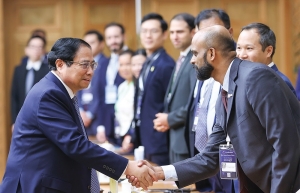 | Game-changing ESG initiatives expected With the Vietnamese government last week boosting commitments to supporting foreign-invested enterprises, more green business and funding initiatives are expected in the coming months. |
| Vietnam can become major semiconductor player During VinFuture Prize 2023, Dr. Sadasivan Shankar, research technology manager at SLAC National Laboratory and Adjunct Professor in Stanford Materials Science and Engineering, spoke with VIR’s Tuan Minh about his insights into Vietnam’s chances in the semiconductor industry. |
| Semiconductor development surge keenly anticipated Vietnam will look to build on its semiconductor diplomacy with the formulation of a strategy on developing the much-needed products. |
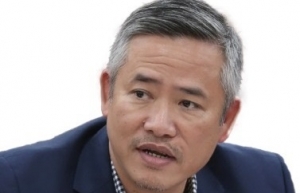 | Consistency required for developing chip industry The Vietnamese government is now paying more attention to promoting research and development (R&D) and developing the semiconductor chip industry. However, to achieve this, depends on many factors, of which R&D, human resources, and others are critical. |
| Bac Giang makes its play for investment in semiconductors Vietnam is hoping to emerge as a top market for semiconductor production. Luong Van Nghiep, deputy director of Bac Giang Department of Planning and Investment, told VIR’s Minh Oanh about the northern province’s potential and its strategies to draw in foreign investors in the sector. |
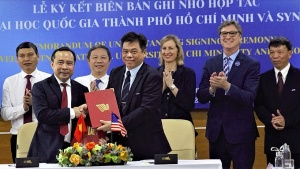 | Synopsys partners with VNU-HCM to offer chip design training On March 15, Synopsys, a leader in software design for semiconductors, signed a cooperation agreement with Vietnam National University Ho Chi Minh City (VNU-HCM) to strengthen training and research capacity in semiconductors, especially in the field of IC design. |
What the stars mean:
★ Poor ★ ★ Promising ★★★ Good ★★★★ Very good ★★★★★ Exceptional
Related Contents
Latest News
More News
- Kurz Vietnam expands Gia Lai factory (February 27, 2026 | 16:37)
- SK Innovation-led consortium wins $2.3 billion LNG project in Nghe An (February 25, 2026 | 07:56)
- THACO opens $70 million manufacturing complex in Danang (February 25, 2026 | 07:54)
- Phu Quoc International Airport expansion approved to meet rising demand (February 24, 2026 | 10:00)
- Bac Giang International Logistics Centre faces land clearance barrier (February 24, 2026 | 08:00)
- Bright prospects abound in European investment (February 19, 2026 | 20:27)
- Internal strengths attest to commitment to progress (February 19, 2026 | 20:13)
- Vietnam, New Zealand seek level-up in ties (February 19, 2026 | 18:06)
- Untapped potential in relations with Indonesia (February 19, 2026 | 17:56)
- German strengths match Vietnamese aspirations (February 19, 2026 | 17:40)

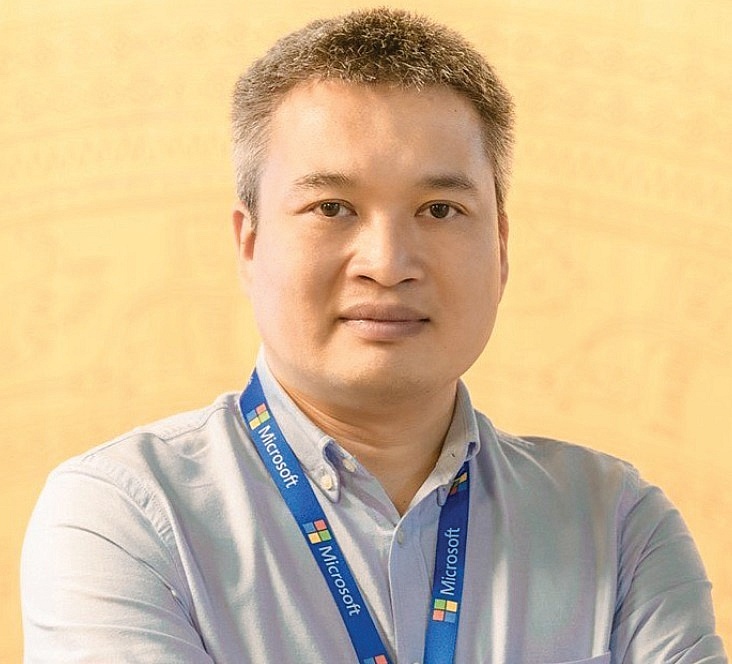
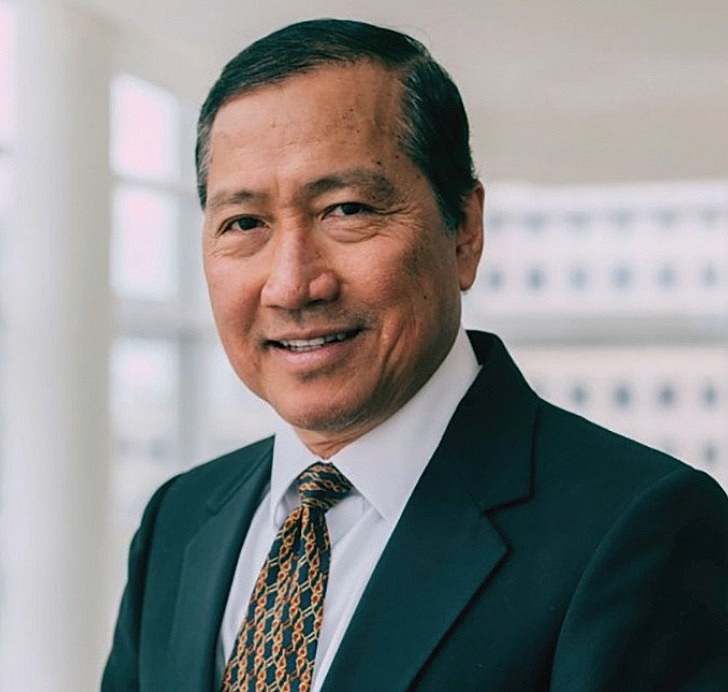
 Tag:
Tag:




















 Mobile Version
Mobile Version